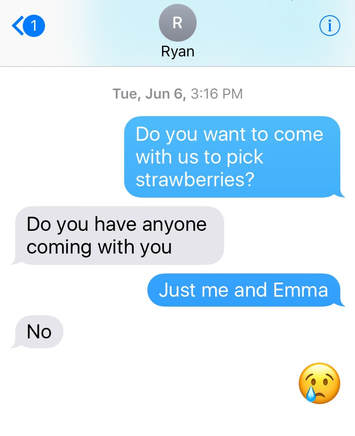You grab your phone to text your BFF some inane nonsense, you think you are being incredibly witty so in the excitement of your humor filled moment, you quickly peck at your phone, typing and chuckling at yourself, hit send and smile. Then, because you are so impressed with your wit, you read your humor filled words again and wonder if maybe the words on the screen didn't quite play out like they did in your head, so you mutter to yourself, "Hmmm...I wonder if she will get that...” and wish there was a way to unsend it if she doesn't. Then you sit, worry and wait to see if she responds with a laughing, crying emoji.
You may also have been on the receiving end of a misunderstood, misguided text. Example, you FINALLY have a grown up night out with your husband and damn, if you don't look good. So, you pick up your phone, try and take a picture of yourself in the full length mirror on your armoire, while trying not to cover any part of your fabulousness with your phone in the reflection, snap a pic and send it to your bestie.
You alternate looking at your phone waiting for her response and staring at your gloriousness in the mirror, when in a matter of seconds, you hear that magical ding that a new text has arrived and quickly grab your phone knowing full well she is going to agree with your mirror's reflection. However, once you read it you think, hmmm…wonder what she meant by that? “OMG! Your outfit!" with no emoji. Now, without that two heart shaped eyes emoji you don't know if your bestie approves of your look or if her comment should have had the monkey covering his eyes emoji like “OMG, I can’t believe you still have THAT dress and you plan to wear it. In public.” And you are left wondering if you were right and you do look damn good or if you should be changing your dress immediately.
How did we ever communicate without emojis?
For many individuals with autism, who struggle with language and understanding emotion, participating in a social conversation is kind of like texting before emojis. Was that “fine” sent from your friend that you have to miss your lunch date, really “fine” since she didn’t have the capability to send the kissy face emoji indicating you are forgiven or was that “fine” dripping with sarcasm as you once again screwed up her day and she didn’t have the middle finger emoji to let you know she is more than a little annoyed with your inability to commit to lunch. So much is left to interpretation.
For my son with autism, interpreting other people’s emotions and feelings, especially if they aren’t glaringly obvious (like yelling in shouty capitals), is difficult for him. This often leads him to isolate himself since it is "safer" being alone. Ryan struggles to interpret people's facial expressions and body language so when there is eye rolling or arm crossing, which may help a neurotypical person understand what another person is feeling, it is often lost on him. He is also very literal, so sarcasm, idioms and slang tend to be interpreted very literally. "No the cat does not have my tongue! What would a cat want to do with my tongue?" Because of these difficulties, in Ryan's mind, alone is better than a social, non-emoji blunder.
Imagine trying to communicate with a friend and not being able to know for sure if your friend is being kind when they say, "nice shorts" when they see you wearing your favorite pair of shorts for the fifth day in a row, or if "nice shorts" was meant to be hurtful and sarcastic. Someone with autism may think, "Well, they were smiling when they said it, so they must have been being kind", not understanding that sarcasm and rudeness can also be done with a smile. It's easy to understand then when you Google the word "Autism" and you see words like "isolated", "socially awkward" and "prefers to be alone" why that may be so. It has to be exhausting trying to figure out the context of each and every word AND how to respond appropriately.
So, the next time you send a text, first, choose your words carefully, and second, imagine the context of your words without that winky face emoji. Would the receiver understand with words alone that you were joking or teasing or could your words be misconstrued and if taken literally, be hurtful?
Keep this in mind if you are talking with someone with autism. If you say something like, "Your new shoes are dope" and the individual with autism looks confused, knowing full well his shoes do not resemble an illegal (in most states) substance, clarify it by saying, "Dude, I really like your shoes. I'm giving you a compliment" that might be all it takes for that autistic individual to go out of there way, take a risk, smile and tell someone they see wearing the latest cool Nike's, "Your shoes are dope" and getting a smile back in return.



 RSS Feed
RSS Feed
